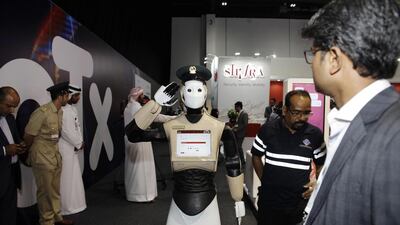The international community must work together to address a surge in transnational organised crime networks. Collaboration, based on a distinct set of procedures, clearly defined roles and responsibilities, as well as technology and planning is of the utmost importance for the future of policing.
While technology, such as robotics and drones, has been helping police forces worldwide reduce crime rates, tragic events have shown that aggregated expertise and cumulative insight make it much easier to tackle security challenges.
The UAE is keen to play a key role in the development of a cohesive global strategy that will ensure the safety and security of the international community and, by extension,its own population.
It has demonstrated its commitment to the Interpol project – Foundation for a Safer World – supporting seven projects, including counter-terrorism, reducing vehicle crime, protecting vulnerable communities, safeguarding cultural heritage, targeting illicit drug trade, preventing trafficking in illegal goods and fighting cybercrime.
This endeavour is a good example of the kind of collaborative effort that is required.
Furthermore, globalisation has led to a marked increase in the number of legal and illegal travellers. With tourism as well as the free movement of goods making significant contributions to the economy, the need to strengthen border controls is now more pressing than ever.
Without proper monitoring, the UAE could become vulnerable to crimes such as smuggling and trafficking.
In this context, border controls across the region have adopted new technologies, such as the retinal scan, that speed up passport control while serving as trusted and reliable verification methods.
Another issue that has troubled the UAE is the high rate of vehicle crime, often resulting in fatalities, due to widespread recklessness among motorists, especially when it comes to observing the speed limits.
The Ministry of Interior and the Criminal Investigation Department have put a host of technologies to good use with the aim of discouraging drivers from speeding.
Combined with stiff penalties for transgressors, a profusion of speed radars, traffic enforcement cameras, licence plate detection cameras and face recognition scanners has that the UAE has reached a new and high level in smart safety measures. Moreover, just as technology is changing the nature of police work, it is also changing the skills and qualifications sought after in security professionals.
Police officers, firefighters and security personnel must, therefore, be proficient in utilising front-line technology if they want to retain a competitive edge. Technology alone is not the answer, but neither is the human dimension. The key to the future of policing lies in skilfully combining the two.
Next year, experts from the global and national security sector will convene at the eighth International Exhibition for National Security and Resilience, ISNR Abu Dhabi 2018. Organised by the Ministry of Interior, the conference will consider a number of topics, such as the future of policing, border control industry standards, artificial intelligence in relation to crime prediction, virtual reality simulations, smart devices and connected technologies and many others.
The need to exchange know-how and expertise is as crucial as ever.
Meline Eolmezian-Soulie is group exhibition director of the security and safety portfolio at Reed Exhibitions

